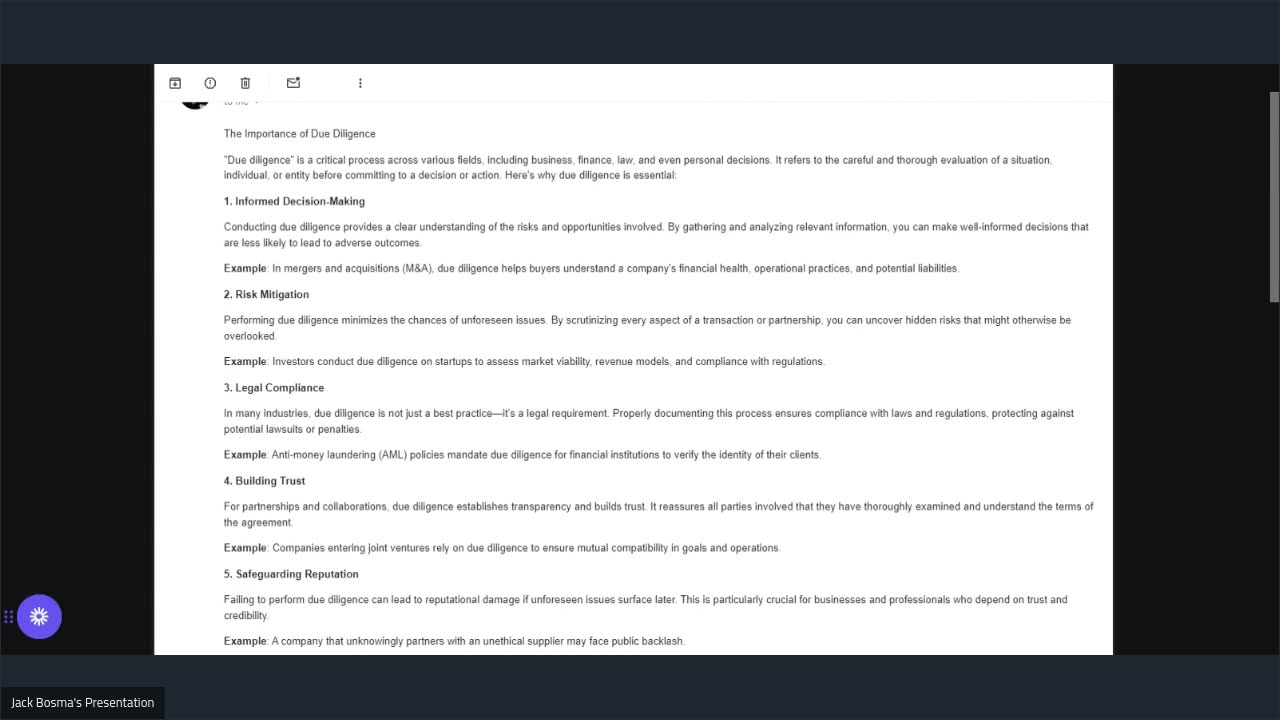Premium Only Content

The Importance of Due Diligence #5
The Importance of Due Diligence #5
"Due diligence" is a critical process across various fields, including business, finance, law, and even personal decisions. It refers to the careful and thorough evaluation of a situation, individual, or entity before committing to a decision or action. Here's why due diligence is essential:
1. Informed Decision-Making
Conducting due diligence provides a clear understanding of the risks and opportunities involved. By gathering and analyzing relevant information, you can make well-informed decisions that are less likely to lead to adverse outcomes.
Example: In mergers and acquisitions (M&A), due diligence helps buyers understand a company's financial health, operational practices, and potential liabilities.
2. Risk Mitigation
Performing due diligence minimizes the chances of unforeseen issues. By scrutinizing every aspect of a transaction or partnership, you can uncover hidden risks that might otherwise be overlooked.
Example: Investors conduct due diligence on startups to assess market viability, revenue models, and compliance with regulations.
3. Legal Compliance
In many industries, due diligence is not just a best practice—it’s a legal requirement. Properly documenting this process ensures compliance with laws and regulations, protecting against potential lawsuits or penalties.
Example: Anti-money laundering (AML) policies mandate due diligence for financial institutions to verify the identity of their clients.
4. Building Trust
For partnerships and collaborations, due diligence establishes transparency and builds trust. It reassures all parties involved that they have thoroughly examined and understand the terms of the agreement.
Example: Companies entering joint ventures rely on due diligence to ensure mutual compatibility in goals and operations.
5. Safeguarding Reputation
Failing to perform due diligence can lead to reputational damage if unforeseen issues surface later. This is particularly crucial for businesses and professionals who depend on trust and credibility.
Example: A company that unknowingly partners with an unethical supplier may face public backlash.
6. Financial Responsibility
For investors, business owners, and even consumers, due diligence ensures that resources are allocated wisely. It helps identify the true value of an asset or deal and prevents overpaying.
Example: Homebuyers conduct property inspections as part of due diligence to ensure the house is worth the asking price.
Key Steps in Due Diligence
Define Objectives: Understand what you need to evaluate.
Research Thoroughly: Gather financial, operational, and legal data.
Assess Risks and Benefits: Weigh potential gains against risks.
Consult Experts: Seek legal, financial, or technical advice when necessary.
Document the Process: Maintain detailed records for future reference.
Conclusion
Due diligence is more than just a procedural step; it is a critical practice for safeguarding interests, ensuring compliance, and making sound decisions. Whether you're an entrepreneur evaluating a partnership, an investor assessing an opportunity, or an individual making a major purchase, due diligence is an indispensable tool for success and security.
Don't Rush
Investigate-Real Estate
Safety-Grand Canyon
Stay Where You Belong-Ocean/National Parks
Risk Assessment-Cook In The Kitchen
Don't Go Backwards Go Forward
--
Let's collaborate!
Thanks,
Jack Bosma
tutorjacknetwork@gmail.com
"Inspect what you expect."
-
 25:49
25:49
Stephen Gardner
4 hours ago🔴Trump Was RIGHT! Newsom’s HUMILIATING Report EXPOSED!
4.43K3 -
 1:36:46
1:36:46
Tucker Carlson
2 hours agoThe Pentagon Didn’t Fire Dan Caldwell Over Leaks. They Fired Him for Opposing War With Iran.
73.1K67 -
 1:34:18
1:34:18
JustPearlyThings
2 hours agoHigh Value Men Are Happy With Wives That Are Mid (Call-in Show) | Pearl Daily
11.5K6 -
 LIVE
LIVE
SpartakusLIVE
3 hours agoGames w/ StoneMountain64 || Duos w/ StevieT into the night
107 watching -
 UPCOMING
UPCOMING
We Like Shooting
13 hours agoWe Like Shooting 607 (Gun Podcast)
127 -
 LIVE
LIVE
Joker Effect
38 minutes agoYOU WOULD NEVER CLICK THIS BECAUSE YOU ARE SCARED YOU WILL LOVE IT.
320 watching -
 UPCOMING
UPCOMING
Anthony Rogers
1 day agoEpisode 363 - Can A.I. Be Used to Talk to the Dead?
106 -
 LIVE
LIVE
Meisters of Madness
4 hours agoThe Umbral Playthrough - Part 2
78 watching -
 58:57
58:57
Donald Trump Jr.
5 hours agoAmerica First, Always. Interviews with Ned Ryun & Kenny Cody | TRIGGERED Ep.235
104K64 -
 LIVE
LIVE
megimu32
2 hours agoON THE SUBJECT: Mixtapes, Mosh Pits & Mistakes: How 90s Rock Raised Us
213 watching